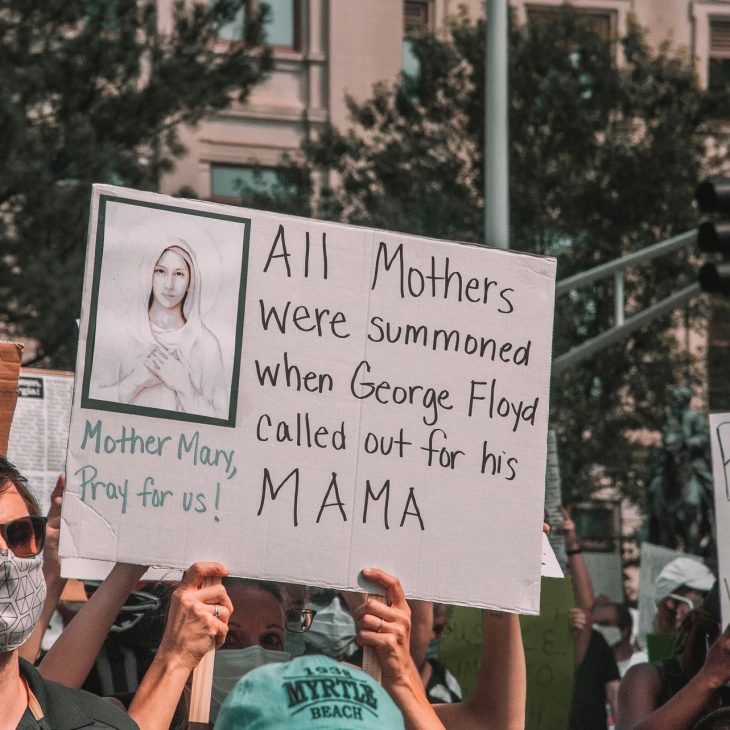A Response To Christians Attacking BLM
August 21, 2020

Mitchell G. Roshannon is an interfaith advocate currently residing in Bloomsburg, Pennsylvania. He is a 2019 graduate from Susquehanna University with a degree in Creative Writing and English Literature. You can follow him on Twitter at @m_g_roshannon.
I look at my Facebook home page and there it is again another post. This time, it’s from a friend’s mother. It says something along the lines of, “Don’t let BLM fool you. They are an anti-Christian terrorist organization that wants to take God from our children and make whites a minority.” I’m both shocked and not shocked at all. I’ve seen this sentiment shared more than a handful of times in some form since the egregious murder of George Floyd.
What I see is perplexing, and I sit with these posts for some time. I wonder, when did Black Lives Matter take an anti-Christian stance?
There is, of course, plenty more wrong with these types of posts and how they speak to and about Black people; how they look to demean Black-led organizations, but that argument I will leave to people perhaps more skilled and qualified than myself to speak to those issues. I’d like to focus on the not so often talked about section of these posts, made by my fellow rural Pennsylvanians, which speaks to the “anti-Christian” sentiment held by BLM.
Two years ago I was on the executive board of Susquehanna University’s Better Together Group, a group dedicated to interfaith activities and bettered understanding. During that time, we had a meeting with some members from Intervarsity Christian Fellowship in which old distrusts and angers towards Christians by atheist and LGBTQIA+ members reared their ugly heads. Our group discovered quickly that it wasn’t the Christian women who spoke to us who were actually the problem in this encounter, they didn’t hold those hateful beliefs, but rather it was our own scars and reactions to them that had to be looked at further. We had to look at ourselves.
Society and I myself, have changed drastically since the day I was in my junior year of college and protected by the progressive bubble of academia. I have since moved to Bloomsburg PA and started working a full-time job in management, both of which have introduced me to concerns I couldn’t see before. The wave of nationalism present before me now, while it does lessen my spirits, forces me to face the exact reason I have supported the interfaith movement; to prevent harm to others brought on by dangerous ideals.
Similarly, I hold true to the importance of looking inwards and finding the faults within ourselves that keep us from successfully moving towards an interfaith-based society. I continue to look for the inherent biases that keep me from being a better interfaith advocate. This is a wonderful thing to do that I hope others will do as well and that I will now challenge my fellow Pennsylvanians and others to do with me.
Black Lives Matter and the larger movement for racial equity is not anti-Christian. According to Pew Research, 79% of black Americans identify as Christians. As such, their work is often led by Christian people, supported by Christian faith leaders, and started or ended with prayer. I as a secular humanist have, on more than one occasion now, prayed in solidarity with Christian protestors for the safety of that protest and the success of the movement it stands with. The BLM website declares, “we are guided by the fact that all Black lives matter, regardless of actual or perceived sexual identity, gender identity, gender expression, economic status, ability, disability, religious beliefs or disbeliefs, immigration status, or location.” It seems to me that BLM have declared themselves in their statement which recognizes the intersectionality of black people to be an interfaith movement.
To use ideas I’ve learned from the work of Ibram X. Kendi which he himself borrowed from Kimberlé Crenshaw; in reality, no organization can be a defender of interfaith beliefs and not anti-racist beliefs; same as no anti-racist organization can truly defend anti-racist beliefs without defending interfaith beliefs. To do one is to do the other. They are one and the same.
I continue to do my inward-looking and find the faults that once kept me from seeing the importance of the intersectionality faith and belief systems play alongside other oppressions. I now must challenge those who have made anti-BLM posts to ask themselves hard questions about how their stance has come about and whether or not the fault really lies with the Black Lives Matter movement, or lies within themselves and their own ways of defining Christianity in an exclusionary nature.
To my Christian Pennsylvanians who do not follow the beliefs of these few; who have made the hard choice to question the information given to them and learn about the oppressions playing with American lives, stay strong. Hold true, knowing that while some Christian people will see you as a traitor to your faith for loving others, there are thousands of neighbors standing by you of different faiths or none at all; including this here Secular Humanist.
Share
Related Articles
American Civic Life
God, Country and the Golden Rule: A Conversation with Paul D. Miller
American Civic Life
Christian Nationalism is a Popular Topic. But What Does it Mean?
Higher Education
What Does Interfaith Engagement Mean from an Evangelical Perspective?



